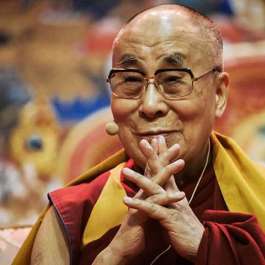Just as the storm does not shake a solid rock,
Even so, the wise are never moved either by praise or blame.
Just as a fathomless lake, a lake so calm, clear, and still;
On understanding the teachings of the Buddha, the wise become perfectly purified.(Paṇḍita Vagga, The Chapter of the Wise; Dhammapada Verse 81-82)

Professor Dr. Kapila Abhyawansa (1938–2024) was an accomplished scholar from Sri Lanka who dedicated more than six decades to Buddhist studies in his homeland and abroad. Prof. Kapila was one of those rare Buddhist teachers who not only enriched Buddhist studies in the academic world through his scholarly works, but also reflected Buddhist education into practice in the Dhamma, the sublime teachings of the Buddha. In serving the Three Treasures as a lifelong vocation, Prof. Kapila enriched many students and colleagues until his passing this year, setting a high standard for many Buddhist scholars who knew him, including myself.
Prof. Kapila Abhyawansa was renowned for his expertise in Indian and Western philosophy, as well as for his specialization in Buddhist scriptural languages: Pāli, Sanskrit, and Sinhala. Since his earlier life, he was interested in Indology, philology, and sacred Buddhist scriptural languages. He obtained a BA in Sanskrit with first-class honors from the University of Peradeniya in Sri Lanka in 1967, then earned an MPhil from Banaras Hindu University in India in 1972. He returned to Sri Lanka and completed his PhD at the Postgraduate Institute of Pali and Buddhist Studies, University of Kelaniya in 1992. Prof. Kapila’s doctoral thesis was titled “Theory of Knowledge of Emmanuel Kant—A Comparative Study with Buddhist Theory of Knowledge,” published in 1997.

Prof. Kapila began his research in Buddhist philosophy and translations of sacred Buddhist texts in his student years. During that time, Kapila published a review of Sidat Sangarā in 1962. Following the aforementioned graduations, for the next six decades of his academic life, Prof. Kapila published 15 academic books and more than 100 scholarly articles on platforms in Sri Lanka and abroad. Among these 14, his ambitious books and translations include:
Sidat Sangarā Vicāraya—A Critical Analysis of Sidat Sangara (1964)
Dhammapada and Dhammapatthakathā—A Modern Exegesis (1968)
Ratna Sāhitya Vicāraya—A Critical Evaluation of the books prescribed for the Examination of University Entrance for 1971–73 (1971)
Cultural Heritage of the Sinhalese (1978)
Kankhavitarani—Sinhalese Translation of the Pali commentary to Patimokkha (1978)
Manorathapurani—Sinhalese Translation of Pali commentary to Anguttaranikaya I (2003)
Manorathapurani-Sinhalese Translation of Pali Commentary to Anguttaranikaya II (2006)
Dahama, Dasuna ha Sasuna, A Collection of Research Articles on Buddhism (2010)

In recognition of Prof. Kapila’s academic contributions, the University of Kelaniya awarded him a DLitt degree during the convocation of the Postgraduate Institute of Pali and Buddhist Studies in 2021. Prof. Kapila had joined the Department of Buddhist Culture at this institute in 1978 as a founding lecturer. Within a few years, he became known for his excellent teaching delivery and comprehensive knowledge of Buddhism. The University of Kelaniya promoted him to senior lecturer in 1984, then to full professorship in 1998. He served as the head of his beloved department for an extended period.
After he retired, Prof. Kapila joined the International Buddhist College (IBC) in Thailand in 2007. From then, until his passing, Prof. Kpaila served the IBC as the vice-rector for academic affairs and dean of the Faculty of Religious Studies, as well as teaching regularly.
Beyond his academic contributions, Prof. Kapila was highly respected by his colleagues and students for his incredible teaching skills. While teaching Buddhist philosophy in the classroom, he would often recite numerous Buddhist discourses from the sacred Pali and Sanskrit traditions from his sharp memory. Because of his skill in referencing Buddhist discourses and spontaneous translations from Pali and Sanskrit, students recall their late teacher as one with an encyclopedic memory. As a person, Prof. Kapila was humble, tender-hearted, and a highly moral Buddhist practitioner. Over the years, he mentored many students by advising their research projects and instructing pupils to translate Buddhist texts into English and Sinhala from Pāli and Sanskrit. He also provided monastic and lay students scholarships to teach Vinaya, the Buddhist monastic law. Prof. Kapila trained many students who subsequently served as Buddhist scholars in prestigious universities and institutions in Sri Lanka, India, Thailand, the UK, the US, and more.
Throughout his life, Prof. Kapila graciously imparted Buddhist practice and Dhamma teachings to his monastic and lay students. He was an inspiration, diligently caring for an enormous number of pupils and interested in both their spiritual and academic growth. As a pupil of Prof. Kapila, I owe him my humble gratitude and utmost respect for his dedication to the path of Buddhist academia. Without his immense compassion, wisdom, and patience in teaching me, it would not have been possible for me to accomplish my academic goals.
This estimable Buddhist scholar passed away on 31 August 2024. He was 86. His absence is deeply felt by his colleagues, students, family members, and Buddhist communities worldwide. May the prolific Buddhist scholar, Prof. Dr. Kapila Abhayawansa, attain the bliss of Nibbana. May his academic legacy inspire us on the path of awakening.
References
Abhayawansa, Kapila. 2010. “The Truth of Suffering and the Truth of Cessation of Suffering: Their Identification in the Buddhist Scholasticism” published in Singapore in the Journal of Patengama Gnanarama Felicitation.
Buddharakkhita, Achariya (trans.) 1985. The Dhammapada: The Buddha’s Path of Wisdom. Kandy: Buddhist Publication Society.
See more
Prof. Kapila Abhyawansa’s biography (IBC)
Sharing of Prof. Kapila Abhayawansa (YouTube)
Q & A by Prof. Kapila Abhyawansa (IBC)












